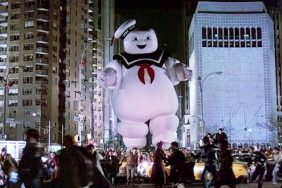It is with the utmost sadness that we report that Harold Ramis, the co-writer and star of Ghostbusters, the co-writer of Stripes, Meatballs and Animal House, and the co-writer and director of Groundhog Day, Caddyshack and Analyze This, died today at the age of 69. The cause of death has been reported as complications arising from autoimmune inflammatory vasculitis. The world of comedy has, in no uncertain terms, lost one of its greatest treasures.
Harold Ramis emerged from the “SCTV” school of comedy, along with his many Canadian sketch comedy alums John Candy, Eugene Levy, Rick Moranis, Catherine O’Hoara, Joe Flaherty, Dave Thomas and Andrea Martin. Their inventive sketches brought them to Hollywood’s eye, providing ample opportunities to craft a career both in front of and behind the cameras. Harold Ramis first debuted as a screenwriter whose films frequently revolved around “Us vs. Them” themes, typified as “The Party Animals vs. The Bourgeois” – a trope still copied to this day – but more significantly they focused on the nobility of the underclass, the philosophy of living freely without much regard for oppressive social convention. And he managed to evoke all that meaning with the simple image of a turd afloat in a posh swimming pool.
Harold Ramis was one of the most beloved comedy filmmakers on the planet, but like many artists his achievements were overshadowed in later years by a series of well-meaning but unimpressive misfires. The prevailing attitude amongst pundits is too often “but what have you done for me lately,” ignoring the bulk of a director’s spectacular career just because his last couple of movies didn’t blow audiences away, only then to about-face when they pass away. True, Harold Ramis’s last few films The Ice Harvest, Analyze That and Year One were among his worst, but they don’t erase the enormous influence and entertainment generated by Caddyshack, National Lampoon’s Vacation and Groundhog Day, or the many comedy classics he scripted, like Animal House, Meatballs, Stripes and Ghostbusters. His place in the comedy firmament is secure, his star will shine brightly.
Join us now for a brief look back at the best and most underappreciated films from a multitalented filmmaker and cherished on-screen performer.
Slideshow: The Essential Harold Ramis
William Bibbiani is the editor of CraveOnline’s Film Channel and co-host of The B-Movies Podcast. Follow him on Twitter at @WilliamBibbiani.
The Essential Harold Ramis
Celebrate the career of writer/director/actor Harold Ramis with 14 of his best films.
-
Animal House (1978)

"Nothing is over until we decide it is! Was it over when the Germans bombed Pearl Harbor? Hell no!"
The original college comedy, on which all the others were based. Harold Ramis's first feature film credit was the screenplay for John Landis's Animal House, which he co-wrote with Douglas Kenney and Chris Miller. The (then) unique blend of heart and filth, of nudity and charm, made Animal House a smash hit, turned co-star John Belushi into a movie star, and gave Ramis his first Hollywood success story.
-
Meatballs (1979)

"Attention: here's an update on tonight's dinner. It was veal. I repeat, veal. The winner of tonight's Mystery Meat Contest was Jeffrey Corbin, who guessed 'some kind of beef.'"
One year after helping invent the college comedy, Harold Ramis co-scripted the first summer camp comedy, Meatballs, which shot "SNL" star and frequent Ramis collaborator Bill Murray to stardom. Although the film is famous for popularizing crude young comedies, the original Meatballs is actually a very sweet look at lovable losers, youthful nostalgia and the importance of role models.
-
Caddyshack (1980)

"In the immortal words of Jean-Paul Sartre, 'Au revoir, gopher.'"
Harold Ramis's first turn behind the camera continued the Animal House theme of party animals pissing off their bourgeois overlords. This time Rodney Dangerfield takes aim at a posh country club, a young upstart caddy challenges major golfing pros, and Bill Murray fights a losing war against a gopher.
-
Stripes (1981)

"When I was a kid, my father told me, 'Never hit anyone in anger, unless you're absolutely sure you can get away with it.'"
Harold Ramis was a regular on the Canadian sketch comedy series "SCTV," but made his motion picture acting debut in Ivan Reitman's Stripes, opposite Bill Murray and John Candy. (Ramis also co-wrote the screenplay.) Some of the jokes a little dated but Ramis's ongoing underdog sensibilities shine through.
-
National Lampoon's Vacation (1983)

"When I was a boy, just about every summer we'd take a vacation. And you know, in 18 years we never had fun."
Harold Ramis's second smash hit comedy behind the camera was National Lampoon's Vacation, the first in the long-running franchise about the long-suffering Griswald family. Nobody melts down like Chevy Chase, and nobody ever made a better Vacation movie (although Christmas Vacation was pretty good).
-
Ghostbusters (1984)

"I collect spores, molds and fungus."
Harold Ramis co-wrote the comedy classic Ghostbusters with co-star Dan Aykroyd, and played the brilliant but socially awkward scientist Egon Spengler, who was very, very concerned about the size of that Twinkie. A genre-warping blockbuster that's never been replicated, no matter how often Hollywood tries.
-
Back to School (1986)

"The football team at my high school, they were tough. After they sacked the quarterback they went after his family."
Harold Ramis co-wrote (with a long list of collaborators) Rodney Dangerfield's best comedy vehicle, in which he played a millionaire who decides to attend college at the same time as his son (Keith Gordon). It's mostly an excuse for Dangerfield to rattle off great one-liners, but it does have a brain: the Kurt Vonnegut gag is one for the ages.
-
Armed and Dangerous (1986)

"There are only two things you have to remember: never fall asleep where anyone can see you and make sure your name is clearly marked on your lunch."
Harold Ramis co-wrote the screenplay for this underrated John Candy/Eugene Levy farce about two undertrained security guards who wind up investigating a crime wave. Candy and Levy were always great together, and although the plot was contrived, the comedy set-ups gave the two comedians a lot of great material to work with.
-
Ghostbusters II (1989)

"We had part of a Slinky, but I straightened it."
The second Ghostbusters wasn't nearly as clever as the original, but it was still unusually funny for a comedy sequel and featured both stunning visual effects and eerie scares. This time the gang is fighting a haunted painting that's corrupting New York City with an underground river of slime. How Ramis and Aykroyd came up with that particularly crazy idea is a mystery.
-
Groundhog Day (1993)

"This is one time where television really fails to capture the true excitement of a large squirrel predicting the weather."
Harold Ramis co-wrote and directed Groundhog Day, arguably the best comedy of the 1990s and certainly one of the finest comedies ever produced. Bill Murray stars as a weather man forced to relive the same day over and over again, giving Ramis the perfect opportunity to play with heavy philosophical ideas, ingenious recurring gags and the idea redemption on an impressive, profound level.
-
Stuart Saves His Family (1995)

"I'm going to die homeless and penniless. I'm still 25 pounds overweight. No one will ever love me. I could just kill myself."
Although it's considered by many to be a terrible dud, and one of the worst spin-offs in "Saturday Night Live" history, Stuart Saves His Family has long since deserved a re-evaluation. Ramis took Al Franken's pep talking loser and told his life story as a non-stop parade of misery, presaging the discomfort comedy Larry David would popularize years later, and daring to highlight the tragedy that most comedies gloss over for the sake of being funny.
-
Multiplicity (1996)

"No clone nookie! Original nookie only!"
Harold Ramis's big special effects experiment wasn't as successful, or as funny, as anyone had hoped but Multiplicity featured groundbreaking visual effects and an impressive series of performances from Michael Keaton, playing a man and his three clones, who each develop personalities of their own after they're assigned to manage different aspects of domestic life.
-
Analyze This (1999)

"What is my goal here, to make you a happy, well-adjusted gangster?"
Harold Ramis's last truly great comedy starred Billy Crystal as a therapist treating a mafioso played by Robert De Niro, in the role that transitioned the actor's dramatic career into a lighthearted one. The concept was eerily similar to "The Sopranos," which debuted the same year, but Analyze This mines the concept for mismatched humor and comes up with gold.
-
Bedazzled (2000)

"It's not easy being the Barbra Streisand of evil."
Harold Ramis's remake of the 1967 comedy classic Bedazzled wasn't as clever or as subversive as the original, but the writer/director came up with some funny new variations on selling your soul to the devil with disastrous results, and had the clever idea to cast Elizabeth Hurley as Satan in a series of fetish outfits, so if you didn't like it at least you had something to look at.









